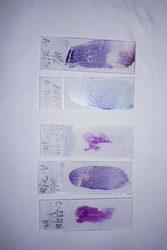Is There Anything Positive About Stains? Just Ask a Chemist
2nd Aug 2023
Stains are often associated with frustration and the need for extensive cleaning. However, in the world of chemistry, stains can actually hold some positive aspects. Chemists have found numerous applications for stains, harnessing their unique properties for various purposes. In this blog post, we will explore some of the positive aspects of stains and how chemists leverage their characteristics to advance scientific research, improve medical diagnostics, and enhance everyday products.
1. Stains as Analytical Tools
Chemists use stains as powerful analytical tools to detect and identify substances. For example, dyes and fluorescent stains are utilized to visualize molecules, proteins, or DNA in laboratory experiments. These stains selectively bind to specific components, allowing researchers to study their structure and function. Stains are also essential in techniques like chromatography, where they aid in separating and identifying different compounds. The use of stains as analytical tools enables scientists to gain valuable insights into the composition and properties of substances.
2. Medical Diagnostics
Stains play a crucial role in medical diagnostics, allowing healthcare professionals to detect and diagnose diseases. Histological stains are commonly used in pathology to visualize and examine tissues under a microscope. Staining techniques like hematoxylin and eosin (H&E) help highlight specific structures within tissues, aiding in the identification of abnormalities or diseases. Additionally, specialized stains like Gram stain and acid-fast stain assist in identifying bacteria and other microorganisms, facilitating accurate diagnosis and appropriate treatment.
3. Stains in Forensic Science
Forensic scientists rely on stains to gather evidence and analyze crime scenes. Bloodstains, for instance, provide vital information about the events that occurred, such as the location and sequence of events. Techniques like luminol staining can reveal blood traces that are invisible to the naked eye, aiding in crime scene reconstruction. Stains from bodily fluids, fibers, or other materials can also help link suspects to crime scenes or identify the presence of certain substances, contributing to the investigation process.
4. Enhancing Product Performance
In the realm of consumer products, stains can be utilized to enhance performance and functionality. For example, the addition of dyes or pigments to cosmetics and personal care products can provide attractive colors or improve product efficacy. Stains are also used in the textile industry to dye fabrics, creating vibrant and long-lasting colors. Additionally, stains with specific properties, such as UV-absorbing stains, are incorporated into sunscreens and protective coatings to enhance their ability to shield against harmful radiation.
5. Stains as Artistic Tools
Stains can even be appreciated as artistic tools. Artists often utilize stains to create unique textures, patterns, or visual effects in paintings, sculptures, or other artistic works. Stains can be used in techniques like watercolor painting, where pigments and dyes are allowed to flow and blend on the canvas, creating organic and expressive designs. Stains can add depth, complexity, and a touch of unpredictability to artistic creations, allowing artists to push the boundaries of their creative expressions.
Conclusion
While stains may have negative connotations in everyday life, in the realm of chemistry, they offer numerous positive attributes. From their role as analytical tools and aids in medical diagnostics to enhancing product performance and even contributing to artistic expressions, stains have proven their value in various fields. The versatility and unique properties of stains continue to inspire scientists, researchers, and artists, showcasing the positive impact these seemingly “undesirable” marks can have on our lives.
Contact us today to learn more about how we can help you achieve your healthcare supply chain goals.
(732) 447-1100 // info@cenmed.com

